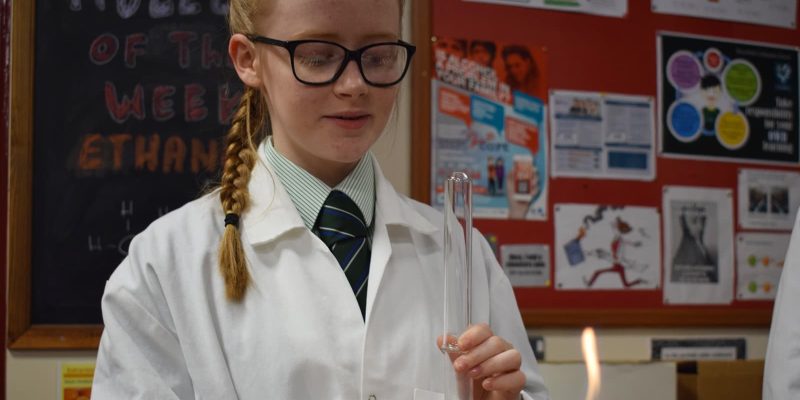Introduction
We want to stimulate and sustain our pupils’ interest in, and enjoyment of, chemistry.
We aim to:
- encourage an appreciation of the scientific, social, environmental and technological aspects of chemistry;
- encourage an understanding of the historical development of chemistry;
- develop our pupils’ appreciation of scientific method and rational thought;
- develop skills in laboratory procedures and techniques, carried out with due regard for safety, together with the ability to assess the uses and limitations of these procedures; and
- develop skills of observation, analysis, evaluation, communication and problem-solving.

GCSE Chemistry
Understanding Chemistry helps us to understand life, the universe and everything! Chemists are the people who transform the everyday materials around us into amazing things. Some chemists work on cures for cancer while others monitor the ozone layer protecting us from the sun. Still others are at the cutting edge of technology, developing new materials such as graphene for use in the electronics industries. GCSE Chemistry sets out to foster interest, enthusiasm and understanding through explorations and investigative experiments. The course has a strong emphasis on practical work leading to proficiency in the skills needed by a practicing chemist. The specification also provides opportunities to develop the students’ appreciation of the wider applications of Chemistry in environmental and technological areas.
Pupils hoping to study GCSE Chemistry should have performed well in their Year 10 assessments.
NOTE: Pupils who wish to study Biology at A-Level are advised to study Chemistry to GCSE Level (this is also possible through the Double Award Science pathway).
Specification
This is a CCEA course. The detailed specification can be found in the CCEA Website.
The specification is divided into three units, one completed in Year 11 and the second and third in Year 12. The third unit involves assessment of practical skills. Many of these areas are familiar to Year 10 pupils so that GCSE Chemistry represents a logical progression from Key Stage 3.
- Unit 1: Structures, Trends, Chemical Reactions, Quantitative Chemistry* and Analysis
- Unit 2: Further Chemical Reactions, Rates and Equilibrium, Calculations* and Organic Chemistry
- Unit 3: Practical Skills
*Note: Good Mathematical skills are an essential requirement of this course.
Examination Summary
Unit 1 (35%): Higher Tier – 1 hour 30 minutes; Foundation Tier – 1 hour 15 minutes.
Unit 2 (40%): Higher Tier – 1 hour 45 minutes; Foundation Tier – 1 hour 30 minutes. Both units 1 and 2 involve externally assessed written examinations consisting of structured questions requiring short answers, extended writing and calculations.
Unit 3 (25%): Both higher and foundation tiers consist of two papers: –
Booklet A (7.5%) 2 hours. Students carry out two pre-released practical tasks in the final year of study.
Booklet B (17.5%) 1 hour. This is an external written examination. Students answer compulsory structured questions that require short responses, extended writing and calculations, all set in a practical context.
Career Pathways
A Chemistry qualification can lead to careers in the Pharmaceutical, Food, Textile, Paint and Dye Industries. Other fields include Forensic Science, Environmental Science, Biochemistry, Material Science and Nanotechnology. Chemistry is also an essential requirement for university courses such as Medicine, Pharmacy, Dentistry, Food Science, Medicinal Chemistry and Chemical Engineering. It has links to other subjects such as Biology, Physics, Geography, Geology and all types of Engineering. For this reason, a solid background in Chemistry is beneficial to any career related to these subjects.
Transferable Skills
Throughout this course, pupils have the opportunity to develop practical, communication, mathematical and problem-solving skills. In addition, Chemistry is deeply ingrained into so many areas of Business and Government that specialised knowledge of it can give a career edge in fields as varied as Product Development, Marketing, Management, Computer Science, Technical Writing and even Law.












